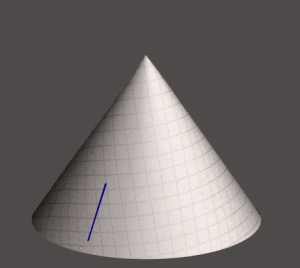gulshanirazmysti00shabuoft-bookmarked
This copy has been bookmarked with the main section headings and subheadings for the English text, and with the main headings for the Farsi text.
gulshanirazmysti00shabuoft-bookmarked
This copy has been bookmarked with the main section headings and subheadings for the English text, and with the main headings for the Farsi text.
Question 1 was about the prophetic concept of thinking and thoughts and their relationship to Haqq and Batil.
Question 2, assumes 1, and asks: what are the proper thoughts for the Salik (Voyager towards Allah).
Shabistari replies: To think about Divine Gifts (Ala’) is correct for the path, to think about Dhat (Inmost Essence) of Allah is absolute sin!
This verse is based upon the Prophet’s saying:
You (all) think about the Ala’ (Gifts) of Allah yet do not think about the nature of Allah (what Allah is), said the Prophet.
Source: http://untiredwithloving.org/fikra_thinking.html
Examples:
Why would scholars of Islam and Sufism ask for the meaning of thinking, hundreds of years ago? Perhaps this Hadith (Prophetic Narration) needed much explanation:
An hour of thinking is better than 60 years of worship, said the Prophet peace be upon him.
http://untiredwithloving.org/fikra_thinking.html
Today this Hadith will rarely be mentioned in the mosques, but way back when people heard it again and again and pondered upon its meaning.
Shabistari versed: Thinking is a voyage, to travel from Batil to Haqq.
Batil means anything other than Allah:
22:62, 31:30. Anna Allah Huwa (IT, He) Al-Haqq Wa(and/while) what you invoke besides Hu (IT, He) it Al-Batil
ذَٲلِكَ بِأَنَّ ٱللَّهَ هُوَ ٱلۡحَقُّ وَأَنَّ مَا يَدۡعُونَ مِن دُونِهِۦ هُوَ ٱلۡبَـٰطِلُ
For meaning of Haqq see:
http://untiredwithloving.org/haqiqa.html
Mufradat
Isfahani
The original meaning of Haqq is conformity or congruity similar to something mechanically/geometrically fitting another thing e.g. a hinge’s pin fitting into the hinge’s socket or cavity (Huqqa) in such a way that the door could swing around the hinge’s pin firmly, when placed into the socket or cavity (Huqqa).
Dara: Door’s utility characteristics functionality and usage are all directly linked to the said ‘conformity’ of the hinge’s pin to hinge’s socket. Without this conformity the door ceases and its functionality and utility of swinging to open/close desist.
Irfan: All that which is from Allah is Haqq (Valid) and all that which is not from Allah i.e. from other than Allah is Batil (Invalid).
Batil produces nothing, engineers nothing, endeavors nothing, while Haqq gives everything its functionality and originates things into being:
34:49. Say: Came Al-Haqq and Al-Batil made nothing and reinstated nothing
قُلۡ جَآءَ ٱلۡحَقُّ وَمَا يُبۡدِئُ ٱلۡبَـٰطِلُ وَمَا يُعِيدُ
In conclusion Shabistari says: One sure bet to voyage towards Allah is via thinking! And to find new things and bring things to fruition and reinstate them is by Haqq and voyaqe to Haqq is thinking.
Residing within this universe will not allow full exposure to Ahadiyat where/when/how/what there is Allah and no one else. Therefore human being needs to voyage to another realm to be able to observe such form of Tauhid (Divine Oneness).
That voyage is impossible, unless by the endowment of a singularity i.e. “I”, voyage through which the laws and constraints of this corporeal universe vanish and the spiritual realm of Ahadiyat made observable (Shuhud), human existence evanesced and as such human being and cosmos become one and the same entity due to close proximity to Absolute Oneness of Ahadiyat.
In that modality of existence the human being is a universe all to himself(herself) and far larger than the cosmos, best coined as “I”.
Lahiji therefore concludes: Know that Insan (Human Being) is chosen to be the transcription of all universes, both corporeal and spiritual, all emerge within his genesis.
Question 3 and 4 concerns the concept of “I”. One might wonder why the scholars of Islam cared about such mundane concept hundreds of years ago, while today not a mention of it!
The answer is found in Qur’an by the unusual usages of pronoun “I” for Allah:
16:2, 21:25. Anna-hu No deity other-than Ana (I)
أَنَّهُ ۥ لَآ إِلَـٰهَ إِلَّآ أَنَا۟
15:49. Inform My servants Ann-i Ana (I) The Forgiver The Rahim (Merciful of spiritual realm)
نَبِّئۡ عِبَادِىٓ أَنِّىٓ أَنَا ٱلۡغَفُورُ ٱلرَّحِيمُ
Remark 1: Note the usage of the verb Nabbi’ (Inform) which the noun Nabi originates from as informer, in this case Inform the servants of “I”, The Forgiver The Merciful.
2:160. Wa (And) Ana(I) The acceptor of repents and the Rahim (Merciful in Spiritual Realm)
وَأَنَا ٱلتَّوَّابُ ٱلرَّحِيمُ
50:29. The Word (Speech) with Me shall not be replaced, and Ana (I) is not shadow-caster to the servants
مَا يُبَدَّلُ ٱلۡقَوۡلُ لَدَىَّ وَمَآ أَنَا۟ بِظَلَّـٰمٍ۬ لِّلۡعَبِيدِ
58:21. Allah wrote: La (For sure) Ana (I) and My messengers shall triumph
ڪَتَبَ ٱللَّهُ لَأَغۡلِبَنَّ أَنَا۟ وَرُسُلِىٓۚ
60:1. Wa Ana (I) know what you (plural) conceal and what you make patent
وَأَنَا۟ أَعۡلَمُ بِمَآ أَخۡفَيۡتُمۡ وَمَآ أَعۡلَنتُمۡۚ
Explicit references to “I” pronoun particularized (Khas) for Moses peace be upon him:
20:12. Inn-I Ana (I) your (Moses) Lord therefore take off your sandals
إِنِّىٓ أَنَا۟ رَبُّكَ فَٱخۡلَعۡ نَعۡلَيۡكَۖ
Remark 2: Order to remove the sandals could be interpreted as there is no material burden of voyage in Divine Presence of “I”, or there is no more voyage or struggle wandering about.
20:13. Wa Ana (I) chose you (past tense) you (Moses)
وَأَنَا ٱخۡتَرۡتُكَ
20:14. Inna-Ni Ana (I) Allah, no deity other-than Ana (I), therefore serve Ni (I, Me), and unwaveringly establish worships to remember Me
إِنَّنِىٓ أَنَا ٱللَّهُ لَآ إِلَـٰهَ إِلَّآ أَنَا۟ فَٱعۡبُدۡنِى وَأَقِمِ ٱلصَّلَوٰةَ لِذِڪۡرِىٓ
27:9. Ya (O) Moses Inna-hu Ana (I) Allah
يَـٰمُوسَىٰٓ إِنَّهُ ۥۤ أَنَا ٱللَّهُ
27:10. (Moses) Do not fear Me (Inn-i), no messengers have feat when with Me (in presence of Me/I)
لَا تَخَفۡ إِنِّى لَا يَخَافُ لَدَىَّ ٱلۡمُرۡسَلُونَ
28:30. That Ya (O) Moses, Inn-i Ana (I) Allah
أَن يَـٰمُوسَىٰٓ إِنِّىٓ أَنَا ٱللَّهُ
And in general (‘Am)for all messengers:
21:15. No deity other-than Ana(I), therefore serve Me
لَآ إِلَـٰهَ إِلَّآ أَنَا۟ فَٱعۡبُدُونِ
Singularity
The best MODEL for describing “I” and how it appeared in this universe, is that of Singularity:
http://untiredwithloving.org/singularity_i.html

Tip of the cone is a singularity where the smooth stokes of the pen cannot longer continue. This cessation of being or being certain ways, due to the fact of breakage of the older rules and constraints is called Singularity.
Imagine two realms or two universes, each universe is endowed with different set of rules for motion; going from one realm to another there must be a region where the rules of either universe is no longer valid i.e. a singularity and the object leaves one universe to enter another via the singularity. For example a larva crosses the singularity of a cocoon to adopt new rules of motion i.e. aerial flight abandoning the completely incompatible crawling motion on branches.
Sifāt or Divine Attributes are singularities. As an example, Mercy is non-existent in the cosmos i.e. there are no atomic or stellar structures or cosmic rules that can be called Mercy; however there is such singularity, through which, entities made from living or unliving or behaviours or thoughts or speech enter into this Mercy-free physical reality and suddenly presence of Mercy is felt e.g. it rains and crops grow thus people feel Mercy has come to them while a moment before they were in despair i.e. felt no Mercy.
Likewise all other Divine Attributes form corresponding singularities, each allowing for entrance of amazing alien behaviours or thoughts or feelings into the cosmos e.g. Justice, Creativity and so on.
One of the most peculiar and most extraordinary such Divine Attribute is ‘I’:
20:14 Inna I (am) Allah, no deity other than I
إِنَّنِي أَنَا اللَّهُ لَا إِلَهَ إِلَّا أَنَا
‘I’, a Divine Attribute, is a singularity through which the individual personas of all of humans enter into this persona-free cosmos.
The rules of cosmos are constrained (Surat) by the Actualizer (Inna) ‘no deity other than I’ and by approaching the singularity of ‘I’ the rules of cosmos break up, violated and become nonsensical.
Remark: For that matter in Sufism the invocation of ‘I’ and verbiage of ‘my’ or ‘mine’ are discouraged.
Mansour Hallaj
“I said: If you do not know Hu (IT, He) then get to know ITs side-effects (Divine Artifact), and ‘I’ (is) such a side-effect (Artifact of Allah’s Presence), ‘I’ (is) the Absolute Reality (Haqq that of Allah), for sure ‘I’ did not (shall not) cease or die down by means of Al-Haqq (Absolute reality due to Allah) for true.”
طاسين الأزل
و قلت أنا: ان لم تعرفوه فاعرفوا أثره و أنا ذلك الأثر و أنا الحق لأني ما زلت أبدا بالحق حقا
He did not say ‘I am Allah’, may Allah ease his journey and cleanse him off the deeds of our people.
And some members of Mankind come too close to the Singularity of ‘I’ and might peek a quick glance into the other universe i.e. Malakut (Realm of Spiritualities) and feel deified:
79:24. (Pharaoh) said: I (am) your Lord the Loftiest
فَقَالَ أَنَا رَبُّكُمُ الْأَعْلَى
“I” vs. Self
English language speaker is often cognizes “I” as Self, for that matter our task of explaining these concepts in Sufi metaphysics gets complicated.
Let’s choose model of a capsule encapsulating a being for Self. What is inside is the Selfsame and what is outside is something else.
Let’s choose the reflection off a mirror for “I”, as in “I see me in the mirror”.

See Also:
http://www.untiredwithloving.org/anna_inna.html
http://www.untiredwithloving.org/ann_inna_grammar.html
Photographs by Seyed Mohammad Hosein Mousavi Jazayeri